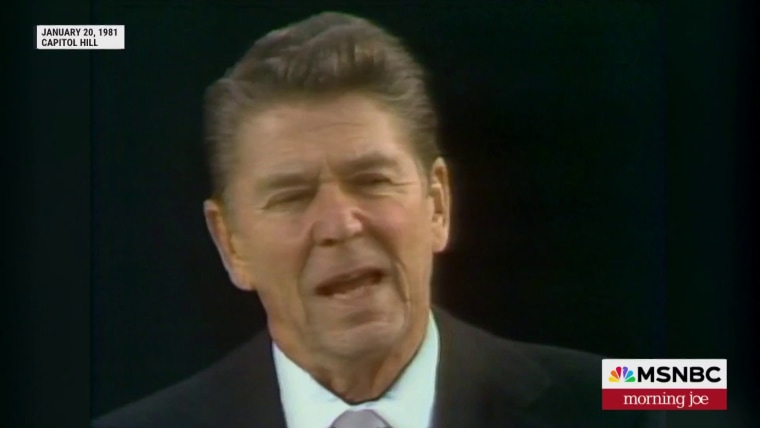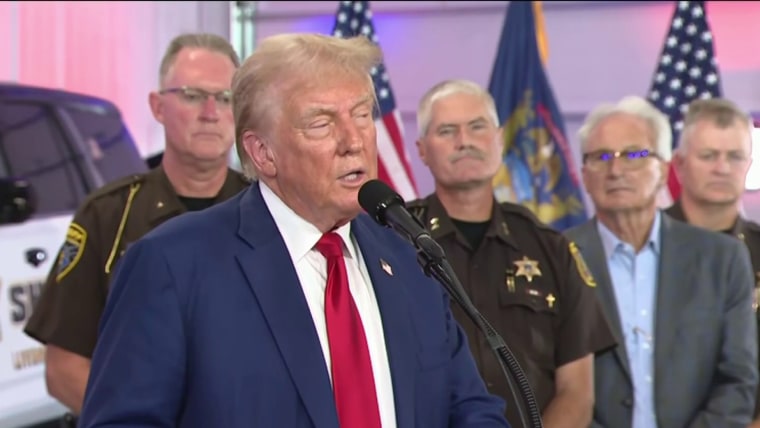Former President Donald Trump stood before the media on Tuesday afternoon to lie about crime. This isn’t the first time he has fabricated fictions about violent immigrants streaming across the border or cities under an onslaught of criminally violent minorities, crumbling pillars of the Republican case against Vice President Kamala Harris. But it was the setting, outside the Livingston County Sheriff’s Office in Howell, Michigan, that infused his rambling with an even darker undertone than normal.
I don’t remember when I first learned about Howell’s association with the Ku Klux Klan. I’m not a native of Michigan; my family moved there the year I turned 12. But by the time I was in college, it was a readily understood “joke” among my friends that there’d be no stopping for gas in Howell if I was in the car. I would stare at the signage on the interstate as we’d cruise past, grateful the tank was nowhere near empty.
Black residents of nearby Detroit knew full well not to set foot in the town, a belief that — if it hasn’t expired — lasted at minimum deep into the early 2000s.
In the 1970s and ’80s, at the peak of the city’s links to the white supremacist movement, Robert Miles, the grand dragon of the Ku Klux Klan, had a Howell mailing address and was known to hold rallies on a nearby farm property. Black residents of nearby Detroit knew full well not to set foot in the town, a belief that — if it hasn’t expired — lasted at minimum deep into the early 2000s.
The city has worked hard to shake that association with hate movements, a project that was damaged last month during a previous Trump visit to Michigan. Though the campaign rally held that day was across the state in Grand Rapids, a small group of masked white supremacists marched through downtown Howell chanting “Heil Hitler.” Later that day, another demonstration was held on a highway overpass, featuring a swastika flag and people chanting, “We love Hitler. We love Trump.”
I want to stress that this was only a dozen or so racists and that the city’s officials don’t support the hatefulness that was displayed. “Although we recognize their right to free speech, these demonstrators do not reflect the values of the Howell community,” the city said in a statement at the time. But it’s not a stretch to say that the men who gathered that day knew the significance of the location they’d picked.
Livingston County Sheriff Mike Murphy tried to de-emphasize the matter in a Facebook post ahead of Trump’s visit. “Within the last month, there’s been a couple of folks that have come here to cause a little bit of a stir, spew some hate speech, white supremacy crap,” he said in the video. He also denied that Trump’s appearance was meant to be a political event, calling it a “press conference,” instead.

Notably, though, Trump didn’t take a single question from the assembled reporters after delivering his remarks, which sounded like his usual stump speech sprinkled with a few dodgy statistics. I’ve been unable to figure out whose figures he was supposedly citing when he claimed that crime had spiked since Vice President Kamala Harris took office. In reality, we’ve seen major declines in violent crime since a peak in 2020, both across the country and especially in Detroit.
But the supposed statistics he was offering were less important than the rhetoric surrounding them. This was an audience that Trump wanted to hear this particular diatribe.
Like his presidency, Trump’s presidential campaigns have always been in a constant state of dissonance between a claimed respect for law and order and a flagrant flouting of the rule of law. He has been quick to sidle up to the police and stoke their belief that any mention of accountability is a grave attack upon them. In speaking with Murphy and several deputies standing behind him, Trump clearly sought to project strength to a sympathetic audience who would accept his entirely vibes-based argument that there’s a “Kamala crime wave.”
The thing is, though, that’s a point that Trump could have made standing in front of SUVs emblazoned with a sheriff’s logo in any small town in any swing state in the country. Howell’s history, both long-term and recent, sets it apart.
The same could be easily said about Trump’s decision to hold a rally in Waco, Texas, to defend the Jan. 6 rioters. It was likewise similar to presidential candidate Ronald Reagan’s choice in 1980 to give a speech about state’s rights at the Neshoba County Fair in Mississippi. Neshoba is the county where civil rights workers Andrew Goodman, Michael Schwerner and James Chaney had been kidnapped and murdered 16 years earlier. Reagan made the deliberate choice to speak there to win over lingering segregationists in the state.
There is no world in which Trump’s team didn’t understand the significance of holding that event in Howell. That he did so is to the great detriment of the people who have worked to show they now outnumber the cowards who chanted antisemitic comments and expressed support for Trump from behind masks last month. Howell is not the place it was in the 1970s and ’80s — but as we saw last month, there are people who hope that it can be again if Trump is returned to leadership. They chanted, “We love Hitler. We love Trump.” Trump hasn’t even condemned them.

